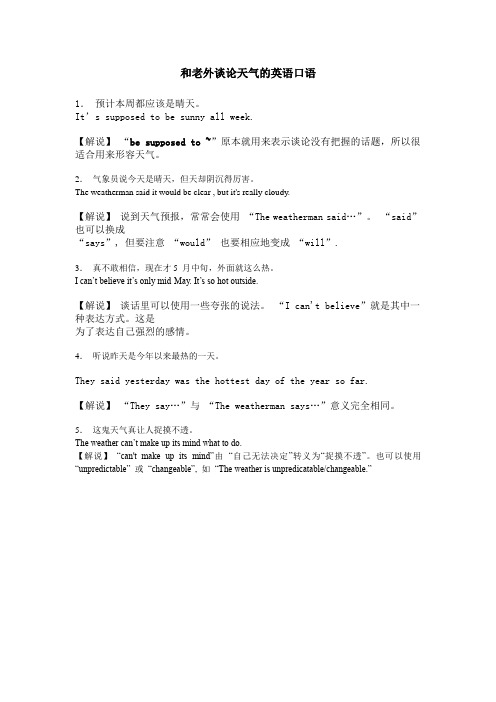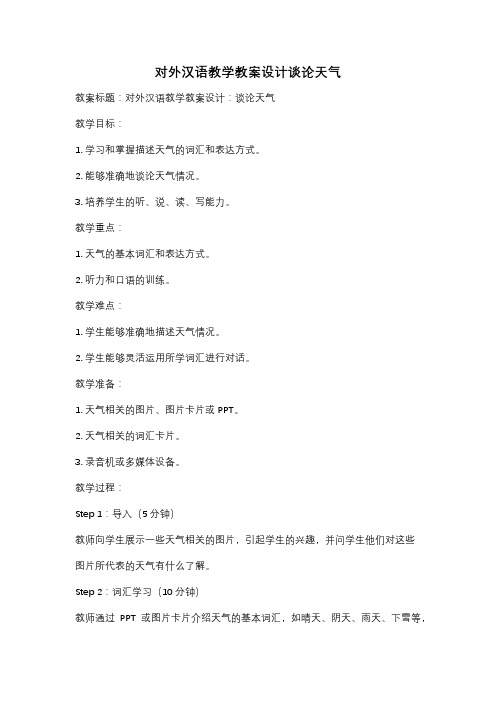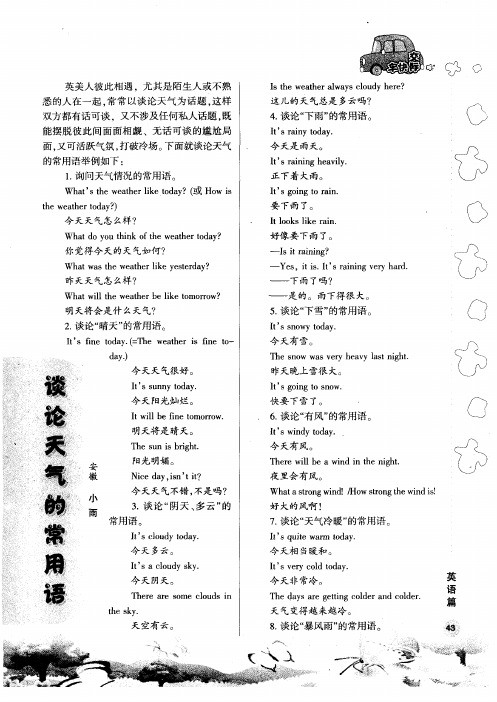谈论天气
常用英语交际口语:谈论天气

★频道为友整理的《常⽤英语交际⼝语:谈论天⽓》,供⼤家参考学习。
1. What's the weather forecast for tomorrow?明天天⽓怎样啊?还能这样说:How is the weather tomorrow?What will the weather be like tomorrow?应⽤解析:broken weather 变化⽆常的天⽓;in all weathers 不论天⽓如何;⽆论命运好坏;make fair weather 谄媚,拍马*;under stress of weather 在恶劣天⽓的影响下2. Nice weather, isn't it?天⽓很好,不是吗?还能这样说:A lovely day, isn't it?It's a fine day, isn't it?应⽤解析:make nice 拘谨,有顾虑;含蓄;more nice than wise 因爱⾯⼦⽽损坏⾃⼰的实际利益;nice looking 五官端正;nice smell 好闻;⾹⽓3. What's the weather like today?今天天⽓怎样?还能这样说:How is the weather today?What do you think of the weather today?谚语:Like father, like son.有其⽗必有其⼦。
4. It is burning hot today.今天天⽓很热。
还能这样说:Today is a real scorcher!It is blazing today.应⽤解析:a hot spot 困难的或危险的情况;热点;hot stuff 第⼀流的⼈或事物;be hot on sb. 迷恋某⼈,爱慕某⼈;a hot potato 棘⼿的事5. I got caught in the downpour.我被⼤⾬困住了。
和老外谈论天气的英语口语

和老外谈论天气的英语口语1.预计本周都应该是晴天。
It’s supposed to be sunny all week.【解说】“be supposed to ~”原本就用来表示谈论没有把握的话题,所以很适合用来形容天气。
2.气象员说今天是晴天,但天却阴沉得厉害。
The weatherman said it would be clear , but it's really cloudy.【解说】说到天气预报,常常会使用“The weatherman said…”。
“said” 也可以换成“says”, 但要注意“would” 也要相应地变成“will”.3.真不敢相信,现在才5 月中旬,外面就这么热。
I can’t believe it’s only mid-May. It’s so hot outside.【解说】谈话里可以使用一些夸张的说法。
“I can't believe”就是其中一种表达方式。
这是为了表达自己强烈的感情。
4.听说昨天是今年以来最热的一天。
They said yesterday was the hottest day of the year so far.【解说】“They say…”与“The weatherman says…”意义完全相同。
5.这鬼天气真让人捉摸不透。
The weather can’t make up its mind what to do.【解说】“can't make up its mind”由“自己无法决定”转义为“捉摸不透”。
也可以使用“unpredictable” 或“changeable”, 如“The weather is unpredicatable/changeable.”。
对外汉语教学教案设计谈论天气

对外汉语教学教案设计谈论天气教案标题:对外汉语教学教案设计:谈论天气教学目标:1. 学习和掌握描述天气的词汇和表达方式。
2. 能够准确地谈论天气情况。
3. 培养学生的听、说、读、写能力。
教学重点:1. 天气的基本词汇和表达方式。
2. 听力和口语的训练。
教学难点:1. 学生能够准确地描述天气情况。
2. 学生能够灵活运用所学词汇进行对话。
教学准备:1. 天气相关的图片、图片卡片或PPT。
2. 天气相关的词汇卡片。
3. 录音机或多媒体设备。
教学过程:Step 1:导入(5分钟)教师向学生展示一些天气相关的图片,引起学生的兴趣,并问学生他们对这些图片所代表的天气有什么了解。
Step 2:词汇学习(10分钟)教师通过PPT或图片卡片介绍天气的基本词汇,如晴天、阴天、雨天、下雪等,并帮助学生正确地读音和理解每个词的意思。
Step 3:听力训练(15分钟)教师播放一段关于天气的录音,要求学生仔细听并回答相关问题。
然后,教师可以再次播放录音,让学生跟读录音中的句子,以提高学生的口语表达能力。
Step 4:口语练习(15分钟)教师将学生分成小组,让他们自由讨论天气情况,并用所学的词汇进行对话。
教师可以提供一些问题,如“你最喜欢的天气是什么?为什么?”来引导学生的对话。
Step 5:写作练习(15分钟)教师要求学生根据所学的词汇和句型,写一篇关于自己所在城市天气情况的短文。
教师可以提供一些提示词汇,如温度、季节、风力等。
Step 6:总结与反馈(5分钟)教师与学生一起回顾所学的内容,总结重点词汇和句型,并对学生的表现给予肯定和反馈。
拓展活动:1. 学生可以自行搜索并介绍其他国家或地区的天气情况。
2. 学生可以进行天气预报的角色扮演,模拟电视或广播天气预报的场景。
评估方式:1. 听力训练中的问题回答情况。
2. 口语练习中的对话流利程度。
3. 写作练习中的语法和词汇使用情况。
教学延伸:1. 学生可以利用所学的词汇和句型,进行更复杂的天气描述,如描述天气变化、天气对人们生活的影响等。
怎样谈论天气

【知识背包】
怎样谈论天气
英国人特别喜欢谈论天气,几乎成了见面的必说之言。
以下是一些常用语。
1.一般性谈论天气:Lovely day, isn't it? 好天气,不是吗?
2.谈论气温:
It's cold today, isn't it? 今天冷,不是吗?
It's very cold, but quite sunny. 今天天很冷,但很晴朗。
3.谈风:
(1) It's rather windy today, isn't it? 今天风相当大,不是吗?
(2) It's blowing strongly. 今天风刮得很大。
4.谈将来的天气:
(1) It looks like rain, don't you think so?天看上去像是要下雨,你不这么认
为吗?
(2) It's quite windy, and there's a lot of snow. 风很大,会有雪的。
5.谈不正常的天气:
(1) It's much too cold/hot. 太冷(热)了。
(2) It's hot for this time of year, don't you think so? 对于每年的这个时候
来说太热了,你不这么认为吗?
(陈玉清编稿)。
英文日常对话话题

英文日常对话话题以下是几个常见的英文日常对话话题:1. 天气:谈论天气是一种轻松愉快的开场白,可以谈论季节、温度、降雨、风力等。
例如,“It's a beautiful day, isn't it?”“Yes, the sun is shining and the sky is blue.”2. 工作和学习:询问对方的工作或学习情况,或者谈论自己的工作或学习。
例如,“What do you do for a living?”“I'm a teacher. What about you?”3. 兴趣爱好:询问对方的兴趣爱好,或者谈论自己的兴趣爱好。
例如,“What do you like to do in your free time?”“I like reading books and listening to music.”4. 旅行:谈论旅行经历,或者计划未来旅行。
例如,“Have you been to any interesting places recently?”“Yes, I went to Japan last year and it was always been great.”5. 健康:谈论健康状况,或者健身和饮食习惯。
例如,“How do you stay healthy?”“I try to eat a balanced diet and exercise regularly.”6. 新闻和时事:谈论最新的新闻和时事,或者分享自己的看法和观点。
例如,“What do you think about the current political situation?”“I thinkit's important for people to stay informed and vote.”7. 家庭和朋友:询问对方家庭和朋友的情况,或者分享自己的家庭和朋友。
为什么英国人喜欢谈论天气(写写帮整理)

为什么英国人喜欢谈论天气(写写帮整理)第一篇:为什么英国人喜欢谈论天气(写写帮整理)为什么英国人喜欢谈天气哈哈,仍清晰地记地上英国文化时,老师提英国人见面一般都谈论天气,诸如说“今天天气真好(It’s fine today, isn’t it?),”或问“你觉得今天天气怎么样?(What’s the weather like today?)”这就好像我们中国人(至少说比较年长的一辈人)见面时常问“吃了没”一样。
令人吃惊的调查结果:2010年5月,ICM的一项民意调查显示,以关心天气而著称的英国人一生中平均有六个月(每年谈论天气的时间约为49个小时)的时间在谈论将要下雨还是出太阳;58%的英国人在与陌生人或生意伙伴交谈时首先会讨论一番是否会下雨或抱怨感叹一通天气的冷热。
为什么英国人喜欢谈天气?英国《每日电讯报》(The Daily Telegraph)的天气专栏作家菲利浦·伊登(PhilipEden)表示,“谈天气这是英国人骨子里的一部分。
我们英国人其实还是一个相对保守的民族。
对于我们来说,谈论天气是一种简单又缓和的打破谈话僵局的方式。
”事实上,英国人不喜欢在别人面前谈论诸如年龄、个人收入、家庭等私事,也不愿涉及当地的政治事务,这样,谈论天气自然成了人们的优先选择了。
当然,这与英国天气的变化无常也是密切相关的。
在英国,这一刻还阳光普照,下一刻就有可能刮风下雨;今天还是夏天,明天就有可能是冬天;而当你还在犹豫出门该不该带伞时,雨滴很可能就在门外跟你打招呼了。
这真的一点也不夸张,英国天气的变化,就连号称世界最先进的英国气象局,也常常搞错天气预报,特别是每年的3-5月份,天气预报就更是天气猜报了。
英国人谈论天气的小故事:萧伯纳(George Bernard Shaw)有一次在散步时遇到个老先生,老先生跟他打招呼说:Good afternoon, Mr.Shaw!It's such a lovely day, isn't it?(下午好萧伯纳先生,今儿个天气真是不错啊!)萧伯纳回答到:Oh, yes.But twenty people have told me about it in past two hours.Thank you.(是啊,但是两个小时里已经有20多个人跟我这么说了啊!)萧伯纳先生表示很无奈啊,合着一天下来每个人都这么跟他打招呼,换了谁都受不了啊,唉,看来真的是伤不起啊伤不起。
谈论天气的口语

谈论天气的口语天气是人们日常生活中经常谈论的话题之一。
无论是向朋友倾诉或者与同事交流,天气总是一个能够引起共鸣的话题。
毫无疑问,天气是一个通俗易懂的话题,不仅可以拉近人与人之间的距离,还能够带给人们许多快乐和愉悦。
在日常对话中,与天气相关的问题往往被用作开场白或者闲聊的一部分。
例如,人们可能会问:“今天天气怎么样?”或者“明天会下雨吗?”这类简短的口语表达常常用于开始一场对话或者转移话题。
人们对于天气的讨论往往涉及到各种各样的话题。
首先,温度是一个重要的讨论点。
当温度升高时,人们可能会讨论如何适应炎热的天气,例如选择合适的服装和饮食。
相反,当温度下降时,人们可能会讨论如何保暖以及防止感冒等健康问题。
其次,降水情况也是人们关注的一个方面。
干燥的天气可能会导致土壤干旱,给农作物生长造成困难。
相反,过多的降水可能会引发洪水等自然灾害。
因此,人们对于天气是否适宜种植、外出或者旅行等问题都会进行讨论。
另外,人们还会讨论到天气对于心情的影响。
阳光明媚的天气往往能够带给人们愉悦和轻松的心情,而阴雨天气可能会让人感到沮丧和压抑。
因此,人们可能会相互询问天气如何以及互相分享天气带给自己的情绪变化。
在一些地区,特殊的天气现象也会成为热门话题。
例如,在春季,樱花盛开的季节,人们常常会聚在一起观赏樱花,并讨论樱花的美丽和花期。
而在冬季,人们可能会谈论下雪的机会以及建造雪人和滑雪等活动。
总的来说,天气是一种常见且通俗易懂的话题,能够促进人与人之间的交流和理解。
无论是家庭成员、朋友还是同事,在谈论天气时都能找到共同话题。
通过谈论天气,人们可以互相分享情感和经历,增进彼此的关系。
因此,在日常生活中,通过谈论天气可以为我们带来许多乐趣和愉悦。
谈论天气的常用语

好 像 要 下 雨 了。
一
你 觉 得 今 天 的天 气如 何 ?
W h twa h ah rlk e tr a ? a st e we t e ie y se d y
I tri i g si an n ?
6 H o s aytig ee a. 写出 同 . ede n ns vr dy f m h y
ft e, my moh ra d I My ft rwo k n a ah r te n . ahe r si
义句1
He o s d e dy a ti g v r hn s e e y
正下着大雨 。
I ’ on o ri . t Sg ig t an
Wht te et r i d y 或 H w i a’ h a e k t a ?( o w h le o s
tew a e t a? h et ro y) h d
今 天 天 气怎 么样 ?
W h td o hnk o h a h rtd y a o y u t i ft e we t e o a ?
I ’ n y td y t Swi d o a .
今 天有风 。
Th r l b n n te n g t ee wil e awid i h ih .
夜 里会有风 。
.
lx I
今 天 天 气 不错 , 不是 吗 ?
W h t to gwi d Ho sr n ewid i! a sr n n !/ w to gt n s a h
— — — —
任 务五 : 根据 短文 内容 , 断下列 句子 的 判
正() F。 1误() ’ 7 T e r fu epe nte asg. . hr ae o r o l i h s e () e p p a
- 1、下载文档前请自行甄别文档内容的完整性,平台不提供额外的编辑、内容补充、找答案等附加服务。
- 2、"仅部分预览"的文档,不可在线预览部分如存在完整性等问题,可反馈申请退款(可完整预览的文档不适用该条件!)。
- 3、如文档侵犯您的权益,请联系客服反馈,我们会尽快为您处理(人工客服工作时间:9:00-18:30)。
Unit 4 Lead In
1.What’s the weather like in your hometown?
●The weathers in my hometown are not very cold, but it rains a lot. It’s usually
hot and wet in summer.
●It’s very windy and dusty in spring, and there’s a long cold winter.
2.How’s the weather today?
●It’s great; it’s warm and sunny outside. There is a little breeze, so it’s not too
hot.
●It’s cloudy, but they say it’s going to rain in the afternoon, and then the skies
will be clear in the evening.
3. How can ordinary people forecast weather?
●They can use their eyes and brains to make weather forecasting. For example,
if they see rings round the sun, they know that a rain is coming.
●If they see a rainbow in rainy weather, they know that the weather will be clear
and fine.
●If the stars twinkle clearly at night, they know that be fine the next day.
4. How do we know the earth is getting warmer?
●We have longer summers, and even in winter we hardly see any snow, theses
changes are sings of global warming, or a result of the greenhouse effect.
5. Do you think weather and temperature can affect our mental activities? Why or why not?
●Yes, I do. For example, when summer comes, we’re less likely to sit still and do
some thinking because the heat makes us restless. But in spring, the weather is quite pleasant and we’re likely to think better and more creatively.
●I don’t think so. You can always keep an active mind if you want to. It doesn’t
depend on hot or cold weather, warm or cool days.
Part 1
A: It looks like it's going to be sunny.
今天看来像是个晴天。
B: Yes, it's much better than yesterday.
是的,比昨天好多了。
A: They say we're going to get some rain later.
据说待会儿要下雨。
B: Oh, let's just hope it stays[维持某种状态]warm.
哦,我只希望一直暖和下去。
PART 2
A: I think it's going to be a nice day.
我想今天会是一个好天。
B: It's certainly a big improvement over yesterday.
肯定比昨天大有好转。
A: But it's supposed to get cloudy and windy again this afternoon. 但是,据说今天下午又要转阴刮风了。
B: Well, the worst of the winter should be over.
不过,冬天最糟糕的一段日子总该过去了。
Part 3
A: It seems to be clearing up.
看来天要放晴了。
B: It's such a nice change.
真实令人高兴的转变。
A: I really don't think this weather will last.
我确实认为这样的好天长不了。
B: Let's just hope it doesn't get cold again.
但愿不会再冷。
PART 4
A: Beautiful day, isn't it?
今天天气真好,是不是?
B: Yes, it's not like what the radio said at all.
是的,一点也不像收音机里说的那样。
A: I wish it would stay this way for the weekend.
但愿整个周末都能保持这样的好天气。
B: As long as it doesn't snow!
只要不下雪就行啊!
Well, as I come from the south of China, I’m not used to the hot and dry weather in Beijing.哦,我来自中国南部,我不太适应北京这种有热又干的气候。
.Frankly, I have to say that I don’t like the weather in my hometown because it’s so humid.坦率的讲,应该说我不喜欢我家乡的气候,因为它太潮湿了。
Pleasant days are what people need most in my hometown.在我的家乡,好天气是大家最渴望的。
Weather has great influence on the crops in different areas.在不同的地域,气候对庄稼都有很大的影响。
The weather is terrible today because of the destruction of nature by human being.
现在的天气非常不好,这是人类破坏自然的结果。
